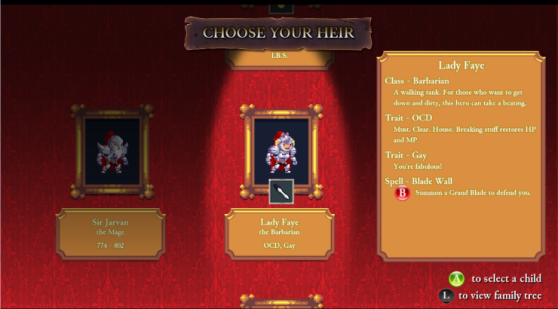I’ve been spending a whole lot of time playing video games lately. Partly because of being on winter break, partly because of all the games I purchased during the Steam sale (too many…can there be too many?), and partly because it’s my way to relax.
What have I been playing, you ask? Some epic RPG? A post-apocalyptic horror game with a twisting, suspenseful story?
Nope. I’ve been playing an old school side-scroller for hours and hours. Sometime the most simple games are the most enjoyable to play.

At first when I started playing Rogue Legacy…I thought I sucked. I kept dying…and dying…and dying. After 1 room. It was kind of ridiculous. Going into the game I knew a little about it’s premise, and so I was expecting to die a lot, but not this much. Did I just suck at this game?
No! The whole point of the game is to die over and over again. See, each time you die, you come back as the heir of the warrior you just were. The quest (and the gear and spells you have collected) keep getting passed on down to the next generation of hero. You are even provided a family tree to keep track of your ancestors.

With each new generation comes new opportunities to explore the castle, new maps to explore with new challenges to overcome (the castle rebuilds itself each time you enter), and new…issues.
See, each character is unique. There are many different classes with their own strengths and weaknesses to choose from. The computer also randomly chooses traits for your new generation.
These traits can be useful, such as Endomorphism which makes you heavier and harder for the enemies to knock back. They can be challenging, like the Vertigo trait that flips the screen upside down. Or they can just be silly, such as the Irritable Bowel Syndrome trait, which makes you make fart noises whenever you jump.
There are so many different traits to play around with. I’m at level 35 and there are still some popping up that I haven’t seen before. Some of the fun of the game is figuring out how these traits manifest themselves in the gameplay, so I won’t spoil them all for you. There are some pretty awesome ones, though.

(Image via Rock, Paper, Shotgun)
The main reason that I decided to write about this game is it’s depiction of mental health issues in a humorous way. Characters with ADHD run faster. Those with OCD want to break everything in the castle (and are rewarded for doing so). Hypochondriacs exaggerate the damage they’ve received.
All of them and more are portrayed in a humorous way. Sometimes humor is exactly what we need to be able to discuss difficult topics. It lightens the mood and makes it easier to make fun of yourself in a positive way. Sometimes it makes the most dire of circumstances look a little less daunting.
And sometimes…it’s just a knight farting when he jumps.












